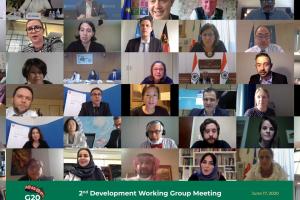The G20 has long recognized that developing countries, just like advanced economies, are central to the achievement of the organization s overarching objective of strong, sustainable, and balanced growth. With the global agreement of the 2030 Agenda for Sustainable Development, the G20 has further stepped up its engagement in this field.
Since then, G20 Leaders have consistently recognized the unique and crucial role of this international forum in advancing and supporting the implementation of the global goals, both within and beyond its member countries borders. This collective commitment is outlined in the G20 s Action Plan on the 2030 Agenda for Sustainable Development, adopted in 2016, and undertaken through concrete actions and annual progress updates.
One of the main topics discussed this year under the Presidency of Saudi Arabia is Financing Sustainable Development so that G20 member countries may create a framework to mobilize as well as improve the efficiency and impact of development expenditure. The goal is to strengthen the G20 commitment to the UN 2030 Agenda for Sustainable Development through concrete actions and cooperation.
Those actions become even more necessary in the current COVID-19 context considering its deep socioeconomic consequences, particularly for vulnerable populations. In this regard, to properly deal with this situation, the Ministry of Social Development of Argentina has two social policy tools to pursue SDG 1 ( No Poverty ), SDG 2 ( Zero Hunger ) and SDG 5 ( Gender Equality ).
First, the National Plan for Early Childhood, which was created to guarantee the healthy and comprehensive development of children in the critical stage between 45 days and 4 years of age in situations of social vulnerability. It has been widely recognized that this is one of the most cost-effective strategies for poverty alleviation.
The Plan is implemented through the Early Childhood Spaces (ECS) program, whose main objective is to provide comprehensive care and early stimulation for children in the critical stages of development. These spaces provide nutritional assistance, health promotion and prevention, early stimulation, motor skills training, and workshops.
In addition, ECSs also provide benefits for two particularly vulnerable population groups: women and children. This is because the professional and productive capacities of women tend to be relegated due to greater care responsibilities, especially in vulnerable contexts. The safe, universal, and free care space offered in EPIs allow women and caregivers to seek job opportunities.
Second, the Early Childhood Food Assistance Policy within the framework of the Argentina's Anti-Hunger Comprehensive Plan is working through five modalities implemented since December 2019, doubling the efforts and the budget in the situation aggravated by the global pandemic in order to reach 11 million people.
In order to address the socioeconomic current crisis, the Ministry of Social Development has increased its focus on the Food Card policy, which is currently being received by 1.5 million people, mostly mothers with children up to six years of age.
Simultaneously, these children are also receiving the Universal Child Allowance (UCA) which guarantees a minimum income for child development. This allowance is also received by women who are 3-6 months pregnant who additionally receive the pregnancy allowance to promote healthy prenatal nutrition. People with disabilities also receive UCA and have been included in the Food Card social policy framework.
Within the set of quarantine measures adopted in Argentina to face the global pandemic, the government guarantees food coverage and economic relief through subsidies and the UCA. These efforts include strong social assistance to informal and vulnerable neighborhoods, to households with children who are exposed to the negative consequences of economic retraction, job destruction, and an increase in poverty.
Argentina, as was stated by President Fernandez on March 26th, is also deeply committed towards the creation of a Global Solidarity Pact that must be a collective guide towards the great reconstruction of the post-Covid world.
This Pact must be comprised of three main components: Health, Economic Recovery, and Social Development. In this regard, global cooperation between developed and developing countries to share resources, enhance strengths, and correct weaknesses is key. Many middle and low-middle income countries have large parts of their population in socially vulnerable conditions and have been greatly affected by the global pandemic. Through cooperation, the gaps and inequalities that Covid-19 has widened can be closed.
This is the way Argentina seeks to satisfy the main objective of both the Sustainable Development Goals as well as the G20 s main goals in this area, which is to implement new, innovative, and socially meaningful ways of financing and mobilizing the 2030 UN Agenda.
-
More information in the Newsletter of the Argentine Embassy in the USA.


